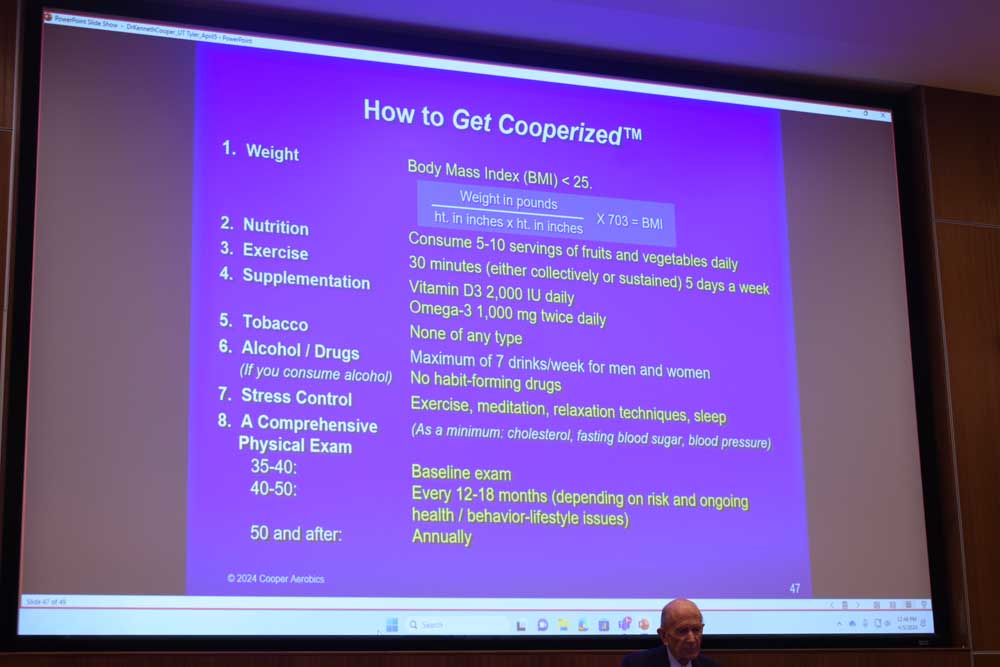‘Father of Aerobics’ Dr. Kenneth Cooper, 93, visits Tyler and talks about importance of exercise
Published 5:35 am Saturday, April 6, 2024

- During a lecture on aerobics, Dr. Kenneth Cooper shares his recommendations for a healthy lifestyle. This includes limiting drinks to 7 a week, exercising daily for 30 minutes and taking vitamins like D3 and Omega-3s. (Raquel Villatoro/Tyler Morning Telegraph)
Dr. Kenneth Cooper, 93, spoke at UT Tyler Health Science Center for National Public Health Week about the importance of exercise and the history of aerobics. Founder of the physical conditioning system that can improve health, Cooper is known as the “Father of Aerobics” and also owns the Cooper Clinic in Dallas.
When Cooper was in medical school in the 1950s, nutrition and fitness were not taught. In high school, he made all-state as a basketball player. However his dad actively discouraged him from continuing basketball and never went to his games. At that time, it was believed poeople could develop an enlarged heart from doing too much exercise, he said. His dad discouraged him because he thought he would die.
“The theory was you get an athletic heart and that’s when your heart gets larger,” Cooper said. “It gets muscular and then when you stop exercising it disburses the fat.”
Cooper helped pioneer treadmill stress tests when he was in the United States Air Force while working with Nasa along with his colleague Dr. Bill Thornton. They developed a way to do them safely without an EKG (electrocardiogram). When he started doing them, people thought they were dangerous. He conducted treadmill stress tests for former president George W. Bush. He said they asked Bush if he wanted to continue multiple times. At one point the chief of cardiology said, “You’re gonna kill the president,” Cooper recalled.
Through the test they found he had 98% obstruction in his left anterior descending artery, LAD, also known as widowmaker, Cooper said.
“If that blocks off, you’re dead because that’s where the heartbeat comes from,” Cooper said. “We saved his life. That was done within two hours.”
At the event in Tyler, Cooper advised people to have a BMI under 25, exercise five days a week for 30 minutes, consume 5 to 10 servings of fruits and vegetables daily, limit alcohol to seven a week and not to use habit-forming drugs. He also advised against the use of tobacco. He recommended people take vitamins D3 and Omega-3s. He also encouraged stress control activities such as exercise, meditation and sleep. He recommends people do a comprehensive physical exam. For those over 50, they should be doing the exam annually. For those 40 to 50, they should be doing the exam every 12 to 18 months. For those 35 to 40, they should do a baseline exam.
“76% of diseases are preventable and 45% of cancers are preventable,” Cooper said. “And no question about the benefits of an active lifestyle.”
Cooper shared statistics from 1970-2015 regarding survival rate for women and men who follow Cooper’s recommendations. On average, the survival age for women is 94.4. The survival age for men is 86.5. This is higher than the average American at 77.
Dr. Jarrett Berry, who used to work at Cooper Clinic with Cooper and now works at UT Health East Texas North Campus, reached out to Cooper for the talk for National Public Health Week after Theresa Byrd, UT Tyler School of Health Professions Dean, asked him about getting him for the talk. She was excited for this talk since she had read his work and gone to various of his talks.
This is the first time Cooper came for a talk at UT Tyler. The first time Byrd met Cooper was 30 years ago.
“I was really happy for people to hear this message that we really can prevent disease and we can lengthen our life and I think a lot of people do not know that,” Byrd said. “They’re not gonna understand how important it is to keep moving.”
For National Public Health Week, UT Tyler partnered with NET Health to conduct various events focused on public health. They emphasized nutrition and fitness. In East Texas, there are underlying factors contributing to the high health disparities.
“We have a real problem in East Texas, we have an obesity problem [and] we have a smoking problem,” Byrd said. “Physical activity is very helpful for those things. It’s hard to be physically active if you’re smoking. Also, physical activity can help people decrease weight, just make them healthier overall. So I think it’s really important.”






